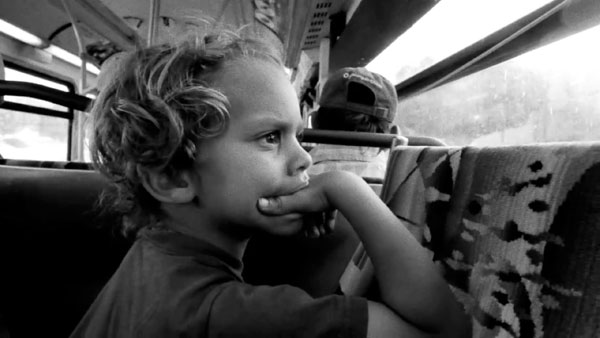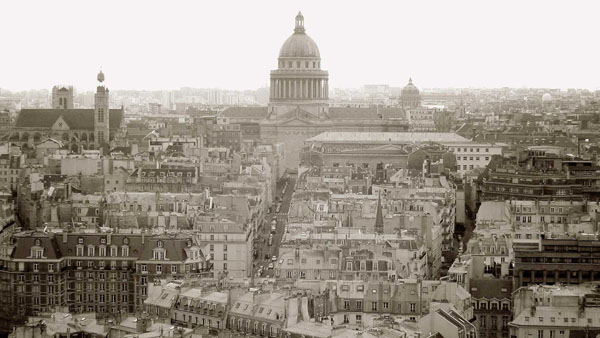First Look, the Museum of the Moving Image’s annual “showcase for inventive new international cinema,” now in its third year, opens tonight with the U.S. premiere of Alexandre Rockwell’s Little Feet and closes on January 19 with Antonin Peretjatko’s The Rendez-Vous of Déjà Vu (La fille du 14 Juillet). Last month, we had, well, our first look at the lineup with descriptions of each of the films from the Museum. Here, we’ll take a second look via the previews and we’ll carry on adding to this entry as the reviews roll in over the next couple of weeks.
And we begin, of course, with Little Feet. “A generation ago, independent writer-director Alexandre Rockwell took the top prize at the Sundance Film Festival for his 1992 comedy In the Soup,” writes Steve Dollar in the Wall Street Journal. “He comes full circle with his latest effort. It’s very much in step with the current moment of low-budget filmmaking, from being shot in classic 16mm black-and-white to the use of family members (Mr. Rockwell’s young son Nico and daughter Lana) and lots of improvisatory charm.”
Writing in the Voice, Sam Weisberg notes that the film “follows two neglected siblings who make the most of their broken, disheveled home. They dearly miss their dead mother, but having a drunken father who returns home only to pass out gives them ample time for nude pillow fights and limitless pasta eating. The hour-long film tracks their trek from the inner city to the ocean, where they plan to deposit a dying pet fish. The luminous black-and-white photography and terrific, jazzy soundtrack propel Little Feet out of cutesiness.”
Interviews with Rockwell: Adam Schartoff (Filmwax Radio) and Henry Stewart (L).
“No true cinephile should miss [Richard Misek’s] delightful Rohmer in Paris, which, short of prompting an immediate flight to Paris, should urge viewers to re-watch every movie Éric Rohmer made in that city,” writes Tony Pipolo for Artforum. “While the work is an undisguised love letter to the filmmaker, it is also a deft piece of film scholarship.” Screens tomorrow (Saturday) afternoon with Rohmer’s 23-minute The Bakery Girl of Monceau (La boulangère de Monceau, 1963).
“The most haunting film of the festival, from Spain, could also be called a documentary,” writes Sam Weisberg. “In The Inner Jungle, director Juan Barrero trains the camera on his real-life girlfriend, Gala Pérez Iñesta, as they cope with an unplanned pregnancy (she wants the kid, he doesn’t). Real ejaculation is shown, and much nude frolicking, but the most lasting impression is of Barrero’s cold, cryptic silences, as his camera zeroes in on Iñesta’s guilt, anger, and lust. (She also plays a mean violin, and will perform a piece in person after the screening.)”
More from Tony Pipolo. Screens Saturday afternoon.
“The women-behind-bars genre… has been a steadfast source of sapphic entanglements, whether presented implicitly or explicitly, luridly or not,” writes Melissa Anderson for Artforum. “Denis Côté’s wry, elliptical, but compassionate Vic + Flo Saw a Bear adds to this illustrious tradition by imagining the prisons his same-sex, ex-con lovers find themselves in—some of their own making—after they’ve been sprung…. Equal parts love story and horror show, it honors two unapologetically unassimilable women.”
Adam Nayman for Moving Image Source: “Along with his adventurous spirit, Côté’s great talent is for regional atmosphere, and Vic + Flo is a uniquely breathable movie.” It’s one of my own favorite films of 2013 and Steve Dollar recommends it as well. Saturday evening.
Last fall, Pat Kewley sent a dispatch from Toronto to PopMatters: “In 1982 monk-turned-film-director Godfrey Reggio released Koyaanisqatsi, a film that, despite being an experimental non-narrative documentary, was a surprise hit that went on to become one of the most successful documentaries of all time, even spawning two sequels (1988’s Powaqqatsi and 2002’s Naqoyqatsi, now collectively known as the Qatsi trilogy).” With Visitors, “he’s managed to top himself by creating a film that actually watches us back.” More from Matt Brennan (Thompson on Hollywood), Eric Kohn (Indiewire), Alison Murray (Filmmaker), Christopher Schobert (Playlist), Alissa Simon (Variety), and Jordan M. Smith (Ioncinema). Reggio, Philip Glass, Steven Soderbergh, and Jon Kane will all be on hand for Sunday’s screening.
Jonathan Holland back in August for the Hollywood Reporter: “A deceptively simple rural drama about a family tragedy set in the isolated Chilean wilds, the [The Quispe Girls] ripples with universal meanings, its bleak austerity spilling over into the authentically tragic. A thoroughly unsentimental study of the passing of a way of life and of the people who lived that life, Sebastian Sepulveda’s beautifully written, played and shot feature debut is as dark, pure and bleak as the lives of its subjects.”
Tony Pipolo: “Set in an austere, punishing mountain terrain far from any city, the three women of the title follow a rough, daily regimen herding sheep and goats, hoping to sell their cheese, spending long days in the cold outdoors and living in a sparsely furnished, fire-lit cave…. Hopeless about the future, the women resort to an extreme solution, as bluntly and unsentimentally presented as the rest of this bleak, unforgettable image of primal existence.” Sunday.
The Summer of Flying Fish is “a Chilean coming-of-age tale that uses its titular critters as metaphors for the wasteful excesses of the idle rich,” writes Adam Nayman. “The attempts of a wealthy citizen to rid his private lake of a school of overgrown carp can be read as a salvo in an ongoing, politically charged battle between the country’s nouveau riche and its indignant indigenous population—a conflict that eventually threatens to spill over onto dry, contested land. In maneuvering from documentaries to fiction features, director Marcela Said stumbles a bit with her narrative, but shows an aptitude for muggy imagery—lots of verdant foliage and smoke on the water.” Sunday evening.
Back to Tony Pipolo, who calls Caroline Martel’s Wavemakers “an intriguing chronicle of the martenot, a musical instrument inspired by its inventor’s fascination with the ‘radio electric interferences’ he heard in transmissions during World War I. Named after Maurice Martinot, this instrument, unlike the Theremin and similar devices, is still in use. It not only served to create sound effects in prestigious movies by, among others, Abel Gance and Marcel L’Herbier, but was embraced by swing and pop bands from the 1930s on.” January 17.
Pipolo again: Ahmad Abdalla’s Rags and Tatters, “though set amid the same events in Cairo as the recent documentary The Square, could not be more different. While The Square immerses us in the immediacy of current events—its rhetoric and politics a bit too neatly drawn—Abdalla’s story unfolds quietly, nearly bereft of dialogue, with a denouement both inevitable and surprising.” January 18.
Adam Nayman: “A prize winner at the 2012 Locarno Film Festival, [Joel Potrykus’s] Ape is an ornery little beast that plays like a scratched B-side to Inside Llewyn Davis; a study of a character whose stubborn commitment to his chosen métier makes him a punch line to somebody else’s existential joke. In this case, Trevor (Josha Burge) is actually a comedian, and not a particularly good one; as the film opens, he’s bombing badly in a near-empty nightclub…. Potrykus has a talent for communicating ideas through mise-en-scene.”
“With its gritty squalor and its penniless protagonist’s reliance on outmoded appliances (VCRs, Walkmans), Ape resembles an unnerving hybrid of Harmony Korine’s Gummo and Frank Whaley’s overlooked The Jimmy Show,” suggests Sam Weisberg. “Until Potrykus needlessly weighs down the proceedings with biblical references, it’s one of the more hilariously disturbing films in recent memory.”
“Perhaps the oddest discovery at First Look,” notes Steve Dollar. Adam Schartoff talks with Potrykus as well as with Museum curator David Schwartz. January 18—but also this Saturday night in Berlin.
Aran Hughes and Christina Koutsospyrou’s To the Wolf falls “into a growing category of films that blur the line between documentary and fiction, while focusing on a specific cultural setting,” writes Steve Dollar. “Poetically somber landscape photography sets the tone for minimalist observations of rural struggle amid the Greek financial crisis. Rough humor and rougher-hewn faces lend character to the mostly atmospheric study.”
Adam Nayman: “The static camerawork and patient pacing make To the Wolf a demanding film, and yet it also has the faintly bewitching quality of a fairy tale—one where the Big Bad Wolf seems to have eaten his fill before the cameras ever rolled.” January 19.
There are three docs lined up for First Look 2014, and Sam Weisberg‘s got a favorite: “David Cairns and Paul Duane’s Natan, from Ireland, a wrenching, overdue ode to the Romanian Jewish film producer Bernard Natan, whose majestic silents and early sound pictures helped put France’s prestigious Pathé studio on the map. In the wake of rising anti-Semitism in the mid-1930s, he was publicly defamed, unjustly imprisoned for fraud, and eventually sent to Auschwitz.”
Tony Pipolo: “This is a piece of early cinema history well worth any serious filmgoer’s attention.” January 19.
Antonin Peretjatko’s The Rendez-Vous of Déjà Vu “is a loopy and audacious comedy with an explicitly political setting,” writes Richard Brody. “It centers on a group of young adults who, in the face of economic crisis, leave Paris for an impromptu beach trip. Two of them—Hector (Grégoire Tachnakian), a guard at the Louvre, and the unemployed Truquette (Vimala Pons), an amateur acrobat—are in love; when they get separated, a carnivalesque chase, led by a quack doctor (Vincent Macaigne), ensues. Peretjatko spins out a variety of comic inventions, including flashbacks and fantasies, perorations into the camera and magic tricks—there are allusions to Woody Allen and Blake Edwards as well as to Jacques Rivette and Jean-Luc Godard—but the movie’s original French title, which translates as ‘The Girl of July 14th,’ reflects the director’s historical ambitions.”
Florence Almozini interviews Peretjatko for French Culture. January 19.
For news and tips throughout the day every day, follow @KeyframeDaily on Twitter and/or the RSS feed. Get Keyframe Daily in your inbox by signing in at fandor.com/daily.





